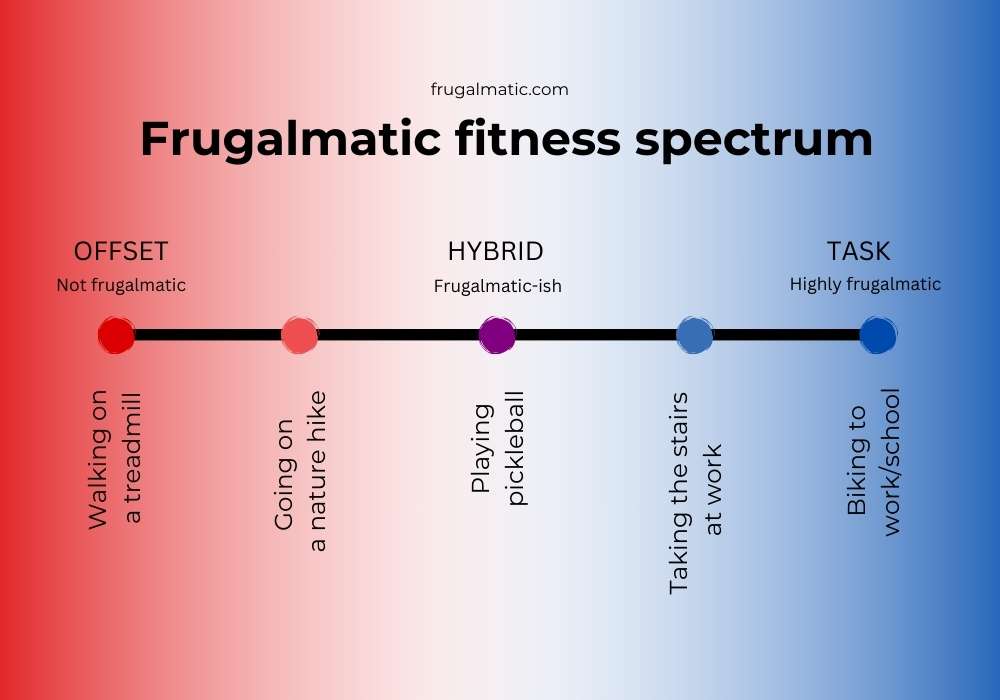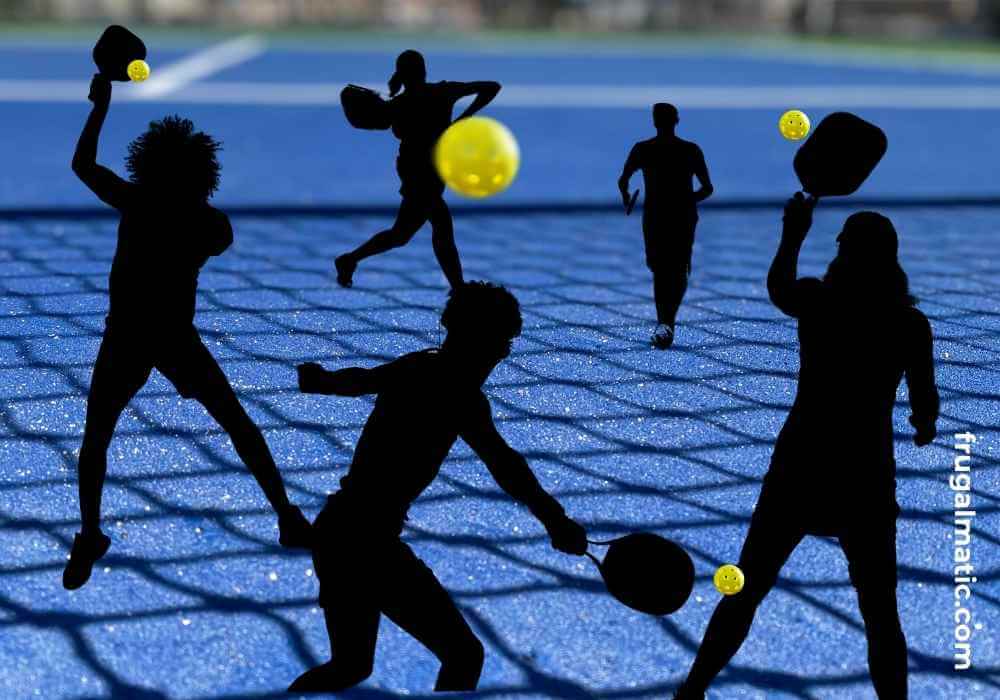This post was last updated on October 19th, 2024 at 01:11 pm
For me, 2024 will be known as the year I discovered pickleball. It hooked me at my first lesson, and now I play whenever I can find the time. I also introduced the game to the whole family, buying all four of us paddles. I’m happy to report my wife has taken a liking to it, and an evening at the courts together sometimes doubles as a date night. There is something special about pickleball, something that makes me reluctant to treat it as ordinary exercise or, as we at Frugalmatic call it, an “offset.”
So what sets pickleball apart from other offsets, including many other sports? (Remember, in the land of Frugalmatic, offsets are movements designed to “offset” time spent being sedentary. Unlike frugalmatic tasks—such as splitting firewood by hand or biking to work—offsets have no purpose other than to maintain one’s physical health.) I argue pickleball belongs on the frugalmatic side of the fitness spectrum, namely because of the ample mental health benefits. It also is relatively inexpensive, and its low impact on the body allows more people to play. These combined factors place pickleball somewhere between an offset and a frugalmatic activity. It’s really a hybrid offset.
How I discovered pickleball
I began thinking about a hybrid category only a couple of months ago. It all started when our two kids and I were biking through a park one day and came upon our town’s pickleball courts. I had seen them before but never paid much attention to the dink-dink-dink sound emanating from the play. The truth is, I had thought pickleball would be a fad, played for a few years and then forgotten. That’s one reason I never became involved. Why waste time and money on something that people would soon stop playing?, I (foolishly) thought.
We stopped out of curiosity, and I soon realized pickleball was more than a fad after striking up a conversation with a woman, who was taking a break between games. She asked us if we had come to play. I said no and that I didn’t know how to play. She then explained that the local pickleball club offered free lessons every Wednesday throughout the summer. She also said I didn’t need to know any pickleball players to join a game. She pointed out a 20-foot rack, on which players hang their paddles to indicate they’re ready to jump into the next game. Oftentimes, complete strangers end up playing together. During our brief visit, there must have been 20 people on the court.
Everything this woman said was a revelation to me. Not only could I learn to play for free, I could easily find people to play with. And so within a few short weeks, I became a regular at the pickleball courts, gleaning tips from better players and striving to improve my game. I did some research, too, and was amazed to learn pickleball has its own professional tour, with top players now earning seven figures.

Why pickleball is a hybrid, not a pure offset
But let’s get back to why I say pickleball is not a pure offset but a hybrid one. My reasoning has to do with a few factors, starting with its social nature.
Pickleball offers a lot of socialization
It’s a great workout but also a very social one. Typically it’s played with four players on a court in close proximity. Tennis is similar but you’re more spread out. In pickleball, you’re close enough to converse throughout a game and get to know your partner a little bit. In addition, the games are relatively short, and while pickleball is a good workout, it’s not exhausting. You maintain the energy to socialize.
I cannot recall meeting more people and making more friends within such a short period of time, at least not in the past 20 years. I’m not an extrovert, either. But I probably have made a dozen or so friends by simply spending time at the pickleball courts. Between games, we talk about all sorts of things: families, jobs, local events, the Milwaukee Brewers, etc.
Pickleball is affordable
Another reason pickleball leans frugalmatic is its affordability. The paddles can be pricey, but it’s a one-time purchase. Access to courts is usually free, at least at public parks. Golf is comparable in terms of the socialization benefits, but it can cost serious money to golf, especially if you’re playing multiple times a week. Also, you don’t necessarily meet new people playing golf but often play with people you already know. Golf also requires a significant time investment, even to play only nine holes. You can play pickleball for as little as 10 minutes or for hours on end. There’s minimal time commitment.
Pickleball has a lower impact on the body
Another factor in pickleball’s favor is its relatively low impact on the body. To be sure, doctors have reported a surge in injuries from pickleball, but the reason so many seniors play is because it’s easier on the body than many other sports. I used to play Ultimate Frisbee into my 40s, but I grew tired of 20-year-olds crashing into me. Basketball carries similar risks, with the possibility of taking an elbow to the face or landing awkwardly on an ankle. Pickleball’s injury risk is not zero, but it’s lower than for many other sports. About the worst thing I’ve experienced is a sore wrist (adjusting my grip cured it, though).
Closing the case for pickleball’s frugalmaticness
The high level of socialization, relatively low impact on the body, and its affordability make pickleball a special type of offset, hence my new “hybrid” categorization. It’s one of the few sports that I’ve played and have enjoyed for reasons having nothing to do with the sport itself. I’ve bumped into some of the players around town, away from the courts, and have had nice conversations with these new friends. Pickleball builds community in a way that typical offsets cannot. The value goes beyond improving one’s physical health.
Other hybrid activities?
To be clear, I’m not claiming pickleball alone warrants a hybrid designation. Whether an activity proves frugalmatic is highly subjective. It’s easier to identify activities on the extreme ends of the fitness spectrum than those activities belonging to this hybrid gray area. For example, walking to work is clearly frugalmatic because of the transportation element. On the flip side, walking on a treadmill is almost certainly not frugalmatic—it’s an offset because a treadmill doesn’t transport you.
I invite my readers and subscribers to offer their ideas for hybrid activities. What other offsets offer benefits that lean toward frugalmatic? Eventually, I may update Frugalmatic Fitness to include hybrids, so I always appreciate your feedback.

